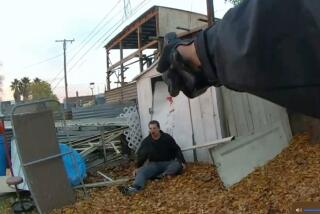Late Mail Deals City a Setback in Effort to Reduce $6.75-Million Award : Courts: A new trial in a police shooting case is denied after the paperwork arrives after the deadline.
- Share via
LONG BEACH — Because of a late mailing, Long Beach officials suffered a setback in their effort to reduce a $6.75-million award to a man who was mistakenly shot in 1988 by a Long Beach police officer.
Superior Court Judge Valerie Baker on Tuesday denied the city’s motion for a new trial in the case of Vanmalibhai Galal, who was shot in the abdomen, because paperwork related to the motion arrived a day late.
Baker also ruled Tuesday that the city must pay Galal and his lawyers an additional $300,000 in legal costs and expenses. A Superior Court jury in July awarded $6.75 million in damages to Galal and his wife.
Long Beach Police Officer Gregory Allison accidentally shot Galal, then 60, confusing him with a suspect he was chasing. In a series of operations, Galal’s gallbladder and part of his liver were removed.
The jury awarded such a large amount because they thought that the Long Beach Police Department had tried to cover up the shooting, Galal’s attorneys have said.
After Tuesday’s ruling, City officials quickly filed a notice of appeal.
Assistant City Atty. Robert Shannon said the development will probably have little effect on the city’s effort to reduce the award, which officials consider excessive. The case probably would have ended up in the appellate court anyway, he said.
Shannon said the city will contend that the award is excessive and that there were errors of law concerning evidence presented at the trial.
“We believe we’re going to prevail in the court of appeal,” Shannon said.
But one of Galal’s lawyers said he considered Tuesday’s ruling a victory because appellate judges traditionally have been reluctant to rule on the issue of excessive damages when the trial court judge had not made a post-trial ruling on the award.
“We think it’s significant,” lawyer Brian J. Panish said. “We think they’re in a hole and will get deeper in it.”
David I. Levine, a professor of law at the University of California’s Hastings College of the Law, said the ruling could hurt the city.
California law requires the trial court judge to rule on issues of excessive damages within strict time limits, said Levine, author of a book on California civil procedure. If the city missed the filing deadline, Baker probably ruled correctly and the appellate court probably will not review the issue.
“But that doesn’t mean the defendant can’t bring the issue up in another form through challenging some other ruling of the trial judge,” Levine said.
Shannon said the court papers apparently arrived late because of a slow postal system. He said a secretary put the papers in the city mail system Aug. 6, several days before the Aug. 10 deadline.
“We have every reason to believe that it left City Hall on Aug. 6,” Shannon said. “Obviously, with the amount of mail that goes out, nobody can say they actually saw the letter go out.”
Shannon said the city should have had a messenger deliver the papers.
“The mistake was made,” he said. “No question about that.”
More to Read
Sign up for Essential California
The most important California stories and recommendations in your inbox every morning.
You may occasionally receive promotional content from the Los Angeles Times.













